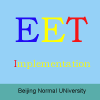-
Online Learning Adventures Work!
普通类 -
- 支持
- 批判
- 提问
- 解释
- 补充
- 删除
-
-
Online Learning Adventures Work!
STUDENT EFFORT, ACHIEVEMENT, AND INTEREST are increased in classrooms that implement Online Learning Adventures (OLA's) effectively. Constructivist classrooms can easily support the elements of OLA's and research supports their effectiveness.-
Elements of Online Learning Adventures

Students collect samples from a White Pine tree with their teacher in the ForestWatch Program.

Email, Chats, and Online Research are utilized in many OLA's.

Video Conferences with participating schools or specialists can be conducted.
Students usually work in teams and participate in projects that involve students from a variety of geographical areas. The project data can be collected by students or by professionals.
A project can be based on sharing research between participating schools and contacting specialists for support. Alternatively, schools can follow the progress of a project conducted by professionals and analyze the data collected.
Regardless of the format of the OLA, students use technology to communicate about the project. Communication could include:
Emailing a school about data collected
Visiting a website to upload or analyze data.
Holding a web conference with another participating school, a specialist to answer questions, or even with the individuals involved in the project.-
Support Online Learning Adventures
REAL TIME, REAL PLACE refers to the "live" nature of OLA’s. Students follow events through their online connection and respond to the events. This helps them experience cognitive conflict (Savery & Duffy, 1995). Cognitive conflict occurs when students are exposed to something that contradicts their original thinking and a new understanding results. These events naturally happen during unrehearsed projects where the outcome is unknown. This can also occur when projects are carried out on school grounds and results are shared online with partner schools and specialists.

SITUATED LEARNING is vital in order to develop higher order thinking skills that are well adapted to the complexity and ambiguity of the real world (Reeves & Reeves, 1997). Students collect and analyze data, report outcomes of experiments that they conducted and in some OLA’s they give the program participants that they are following advice about decisions that they need to make. All of these authentic activities develop the higher order thinking skills referred to earlier.
OLA Possible Questions
Feederwatch How do I design a bird feeder to attract a certain bird? Which birds visit my region?
JASON Depends of project focus, JASON XV is Rainforest at the Crossroads. Students examine a rainforest in Panama and assess sits chances for survival. What affects the health of a rainforest?
Forestwatch How does air quality affect white pine tree health?
CIESE Projects A variety of projects that are ongoing. An example is: Do you use the same amount of water per day as people in othercountries?
CONSTRUCTIVIST TEACHING STYLES promote authentic learning. OLA’s are based on current situations with unpredictable endings. Asking questions, learning by doing, and making connections are all part of the Constructivist classroom.
Effective "instruction" is really modeling, coaching and then fading, as students practice their active learning skills in case-studies, microworlds, simulations or best of all, real, hands-on activities (Jonassen, 1994).
OLA’S SUPPORT TECHNOLOGY AS "MINDTOOLS". Students use technology in OLA’s to conduct research and communicate with other students and scientists or specialists. According to Jonassen, mindtools help students transcend mental limitations and computers serve as extensions of the mind. OLA’s use technology in exactly that way!
STUDENT LITERACY in OLA’s is more than just reading and writing. Students must research, interpret facts from a variety of resources, synthesize facts, form opinions, and then publish their findings in their classroom, school, community, or even on the web. This leads to the development of thoughtful, informed writing. The opposite of the type of literacy that technotainment encourages(MacKenzie, 2001).
Still Not Convinced?
Consider MacKenzie’s view of literacy (Mackenzie, 2001). He defines "literacy" as the ability to interpret, reason, and understand. He contends that students need to become "infotectives" capable of solving information puzzles with a combination of inference skills and new technologies.
"Infotectives" are skilled thinkers, researchers and inventors, rather than memorizers and regurgitators. They make their own meaning by puzzling their way through piles of information by sorting, sifting, weighting and arranging until a picture emerges.
If this seems like what you want for your students, then Online Learning Adventures could help you reach your goal. Exposing your students to "real life" experiences provides the connections required for authentic learning.-
More Information
The JASON Project
Project Feederwatch
Forestwatch
CIESE Projects
Online Learning Adventure Research-
Author
Jonathan Leavitt
Graduate Student
SDSU Educational Technology -
-
- 标签:
- literacy
- skills
- projects
- ola
- work
- online
- students
- project
- learning
- olas
- adventures
- research
-
加入的知识群:



学习元评论 (0条)
聪明如你,不妨在这 发表你的看法与心得 ~